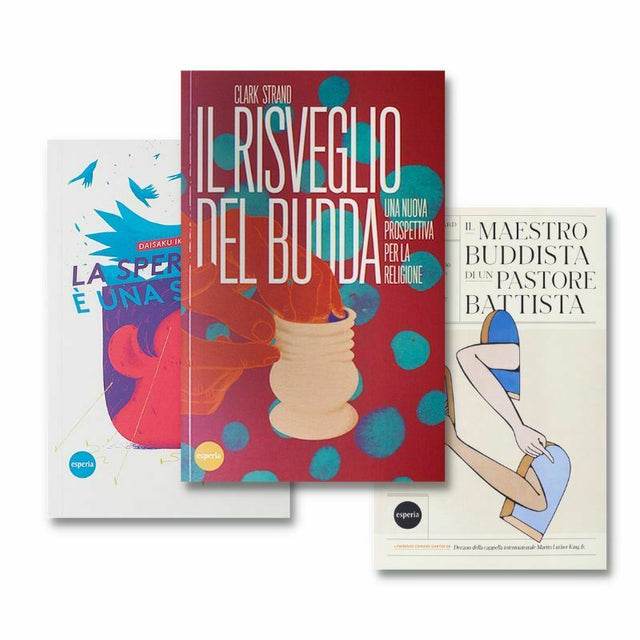
Insights
-
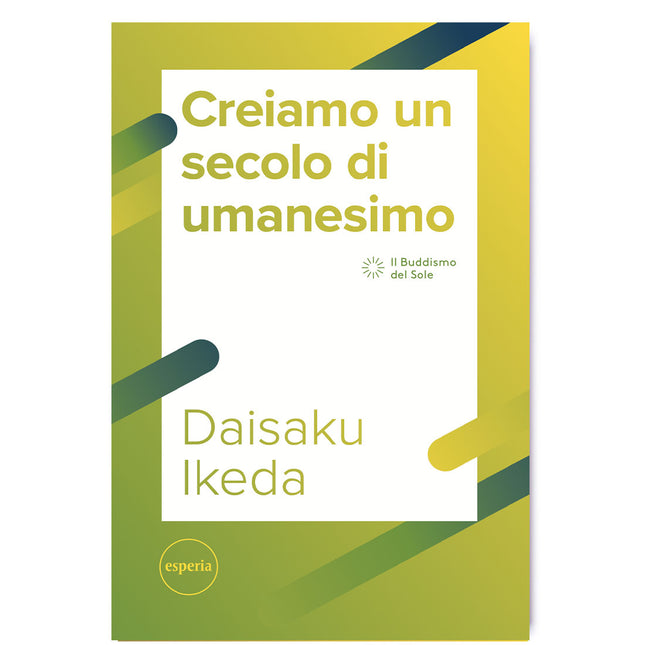
Esperia Let's create a century of humanism
The book explores some concepts of Nichiren Daishonin Buddhism, with a focus on the importance of respect for the dignity of every human being, compassion and active commitment to one's own and others' happiness. Through an analysis of the figure of the Bodhisattva Mai Sprezzante and the kosen rufu movement as a whole, Master Ikeda invites us to turn challenges into opportunities, to help build a peaceful and just society, and to cultivate a solid and unwavering faith. "Nichiren Buddhism exists for the welfare of all people. That is why we should behave like the Bodhisattva Mai Sprezzante, respecting each one of them and wishing them to shine to the fullest. One does not build one's happiness on the misfortunes of others." Daisaku Ikeda
€7,90
-
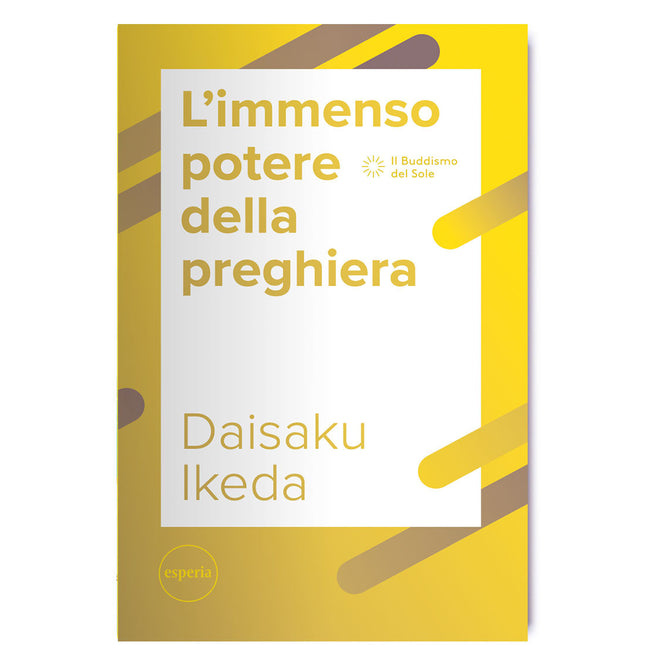
Esperia The immense power of prayer
"To pray, in Nichiren Buddhism, is to make a vow to win absolutely," says Master Ikeda in one of the five lectures in this volume from the series "Sun Buddhism." Beginning with passages from Nichiren Daishonin's writings, the author addresses the topic of prayer, clarifying that prayer based on the Lotus Sutra is a prayer sure to be answered and that through the recitation of Nam myoho renders kyo we can turn everything that happens to us in a positive direction, with the confidence that even one daimoku brings immeasurable benefits. Daisaku Ikeda (1928-2023) was a Buddhist teacher, peacemaker, educator, author and poet. He was president of the international Buddhist lay association Soka Gakkai International (SGI), which has members in 192 countries and territories around the world. He was founder of the Institute of Eastern Philosophy and Soka University. In 1983 he was awarded the United Nations Peace Prize.
€7,90
-

Wisdom for creating happiness and peace - Happiness
This volume contains several excerpts from President Ikeda's writings, selected from an immense variety of sources spanning many decades and including speeches, essays, lectures and dialogues. Sharing with readers his deep knowledge, enriched by his own personal experience, Daisaku Ikeda outlines the distinctive features of Nichiren Daishonin Buddhism, a teaching that enables all people to manifest the inherent Buddha nature of their lives, leading them to absolute happiness. Daisaku Ikeda also guides us to understand that the happiness of the individual is closely related to the happiness of others and makes clear how important it is to be happy in life as well as at the moment of death. "To this day I still vividly remember the conversation I had with my teacher Josei Toda on the day I first met him: 'There is something I would like you to explain to me,' [...] 'Of course, ask whatever you want. "Sir, what is the correct way to live?" With strong conviction he introduced me to Nichiren Daishonin's philosophy of life, encouraging me to study it and put it into practice with youthful energy by cultivating noble ideals. Since that time I have relentlessly walked the path of master and disciple." Daisaku Ikeda, from the Preface. Revised and updated edition of the book previously published under the title What is Happiness
€13,90
-

Esperia Hope is a choice
"What to do when we have lost hope? Is hope something to be rediscovered or built? Can one person really make a difference? How do we maintain our optimism when the world seems to be falling apart around us?" Ikeda reminds us that hope is neither a simple thing nor synonymous with passive acceptance of injustice. These essays invite us to open our eyes to the deep and courageous determination of one who makes hope a decision, invites us on an inner quest to change the world around us. Having known many difficult realities, he reaffirms that life goes on and that the light of hope can emerge from even the darkest places. The renowned Buddhist philosopher Daisaku Ikeda has spent his life pondering such questions. In this collection of highly personal essays, selected from his writings spanning some fifty years, he guides the reader on a journey that aspires to find the answers and hope needed to live in this difficult age.Growing up as a child of war, Ikeda tells us about the experiences that led to his tireless search for peace: his house on fire during the Tokyo bombings at the end of World War II, the death of his older brother on the Burmese front, the vision of an American airman who had parachuted out of the stricken plane.Ikeda's precise reflections on terrorism, good and evil, aging and death offer us new opportunities to look at the world with hope. His emotionally charged words tell us about the poetic spirit and friendship, which can be sources of hope in the darkest of times.Each essay is an opportunity for the reader to go back and look within himself for the strength, courage and hope needed to fuel the collective desire for a just and peaceful society. If we do not feel hope, it is time to create it. Daisaku Ikeda
€10,00
-
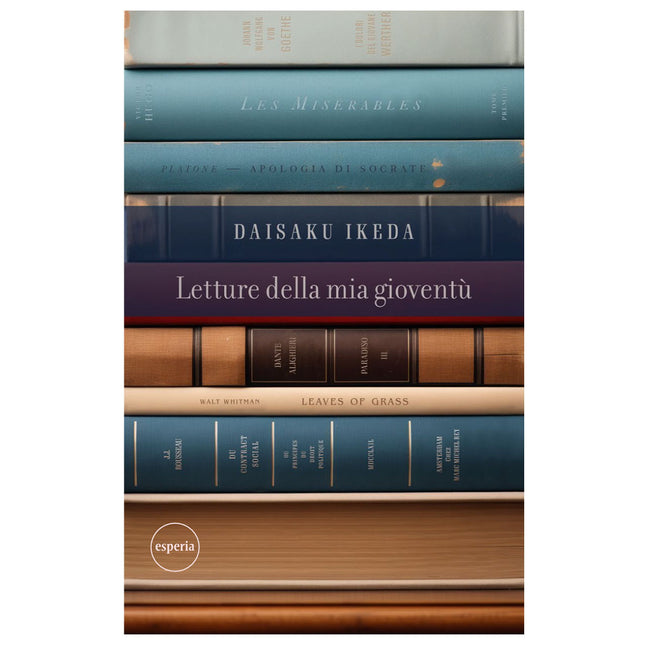
Esperia editions Readings from my youth
Daisaku Ikeda's essays on literary masterpieces. Daisaku Ikeda's fervent passion for reading shines through the pages of this book. This tour of world literature-books, the author tells us, that helped form the "spiritual structure" of his life-will be inspiring. Throughout the chapters we meet heroes, revolutionaries and villains. We hear poets sing their praises to the human spirit and engage alongside philosophers who challenged the established order and illuminated a new way forward. Be moved by the author's words as you discover how great literature can enrich and strengthen Buddhist practice and help bring peace and justice to the world today.
€9,90
-

Esperia editions The Life of Master Ikeda
Daisaku Ikeda (1928-2023) exemplified boundless courage, compassion and wisdom based on Buddhist teachings and the noble spirit of non-duality of master and disciple. His figure is to be counted among the most eminent in the history of Buddhism, having spread the Buddhist philosophy of respect for the dignity of life throughout the world, expanding the Soka Gakkai peace movement to 192 countries and territories.The six essays in this book trace some of the major events in Ikeda's life and his impact in the history of world Buddhism, from the years of his youth and meeting with his teacher Josei Toda to his inauguration as the third president of the Soka Gakkai; from his shared struggles with fellow believers in Japan to the creation of a global movement for peace, culture and education; from his engagement in dialogue with personalities from the most diverse geographical and cultural backgrounds to his "struggle of the pen" as a prolific writer and poet, carried on tirelessly over the years. Until the final undertaking of his life, that of giving concrete form to the Soka educational system, a pedagogical framework that spans the entire school cycle, from preschools to Soka University. He also founded several institutions for the promotion and dissemination of culture and peace such as the Institute of Oriental Philosophy, the Tokyo Fuji Art Museum, and the Min On Concert Association. In 1983 he was awarded the United Nations Peace Prize.
€13,00
-

Esperia Master and disciple
The Gosho and the non-duality of master and disciple. Nichiren explains several times in the Gosho that we can fully fi orm our humanity only through a master. Even in European culture, a well-known aphorism goes that we are "dwarfs on the shoulders of giants," meaning that however limited we may be, we can always see a little further because of the achievements of those who have lived before us. But in Nichiren Daishonin Buddhism, the master-disciple relationship is much more than this: there is no master without disciple, and vice versa. And this relationship, which is more accurately called non-duality of master and disciple, aims to transform frightened cubs into lion kings; to bring out of the disciple's life the Buddha's vital state, which is free from fear. Our master, Daisaku Ikeda, never tires of reminding us of the function and importance of the figure of Josei Toda in his life and the equally important figure of Makiguchi in Toda's life. " I still remember when I met, about forty years ago, a famous Japanese critic and intellectual. He introduced himself rather pompously, boasting about his illustrious birth and the elitist education he had received. When it was my turn I simply said, "I am the direct disciple of Josei Toda, and I consider him my greatest pride and honor." - Daisaku Ikeda
€13,00
-
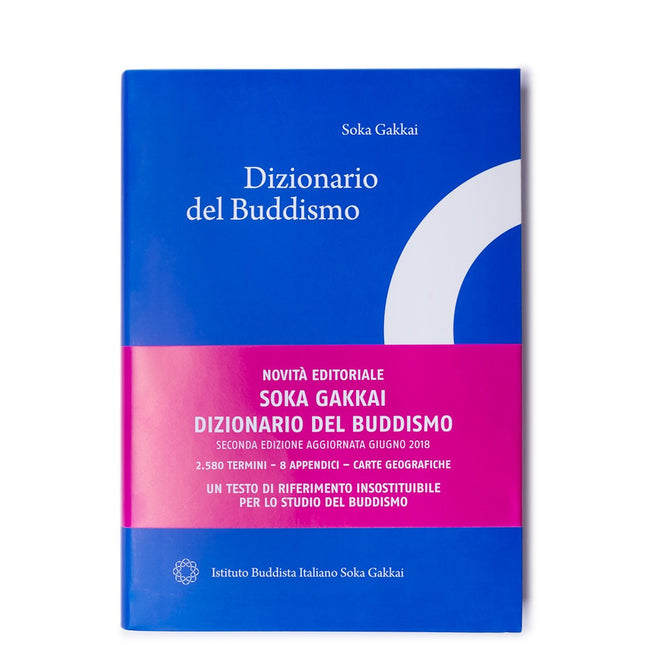
IBISG Dictionary of Buddhism
This volume contains 2580 terms indispensable for learning about the Mahayana Buddhist tradition based on the Lotus Sutra. In particular, it refers to the writings of Nichiren Daishonin Buddha, who worked for a return to the humanistic meaning of the teachings of the historical Shakyamuni Buddha. It is one of the most extensive collections of Buddhist terms in Italian currently on the market. "Had the Buddha, after awakening to the Darmha, or Law of Life, not engaged in teaching it to others, his enlightenment would have been incomplete. Inoltr, even if the Buddha himself had expounded this Law without others participating in its dissemination, it would not have benefited people. It is our hope that the publication of this dictionary in Italian will serve to make the wisdom of Buddhism accessible to more and more people, enabling them to find a path to true happiness and thus contributing to the realization of a peaceful world. If by reading this dictionary, people will be able to deepen their understanding and appreciation of Buddhist philosophy, I will be deeply pleased."
€39,00
-

Esperia The mysteries of birth and death
Although over seven hundred years old, Nichiren Buddhism offers a very valid prescription for the sense of helplessness and despair that pervades society today. Fate, of course, does not always turn out to be in accord with our desires, but Buddhism, and especially Nichiren Buddhism, enables us to develop the power needed to transform it. Nichiren Buddhism casts its light on all aspects of human life by penetrating its core. Universally applicable to all humanity and in all circumstances, it is worthy of lifelong study and practice.
€12,00
-

Esperia A leadership revolution
Compilation of Daisaku Ikeda's encouragements to Soka Gakkai leaders in the years between 2004 and 2008. "Rather than judging people as capable or incapable, it is better to look for each person's strengths. The growth of capable people depends on the determination of those in charge. "In his encouragements to Soka Gakkai central leaders in recent years, Daisaku Ikeda identifies characteristics for expanding the kosen rufu movement into the future. The message that emerges above all others is that "what matters is the heart."
€9,00
-
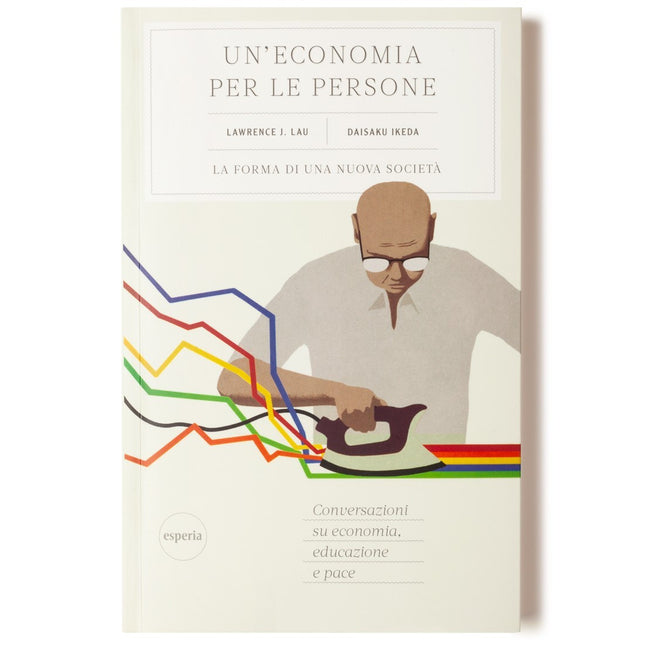
Esperia An economy for people
It is indisputable that economics plays a vital role in our lives, both on an individual and societal level. Yet, many people find the topic complex and difficult to deal with and tend to avoid dealing with it. In this dialogue, economist Lawrence J. Lau and Buddhist philosopher and president of the International Soka Gakkai Daisaku Ikeda approach the topic of the development of economics in modern society from a historical perspective, examining what lessons can be learned from the East Asian currency crises in 1997 and the global financial crisis in 2007-2009. Touching on various topics, the authors help readers understand the challenges that globalization has imposed on economies, the importance of government regulation of markets, and the delicate issue of combining a country's economic growth with the well-being of the population as a whole. These conversations, in which the economic aspects are not separated from people's daily lives, thus become small lessons in economics, in which, thanks to simple language within everyone's reach, we can begin to unravel the mystery of economics, a discipline that concerns the backbone of the world in which we are immersed, knowledge of which is often precluded by technical complexities and specialized terminology. "Economics," said economist John Kenneth Galbraith, "must serve for human happiness," and "the fundamental force that moves the economy is people." Daisaku Ikeda is president of the Soka Gakkai International (SGI) and leader of the Buddhist movement that draws on the teachings of Nichiren Daishonin. An activist, philosopher, educator and poet, for more than 70 years Ikeda has been dedicated to spreading Buddhist humanism around the world and building the foundation for a culture of peace. SGI, which has members in 192 countries and territories, encourages individuals to develop their inner potential and contribute as global citizens to overcome the collective challenges facing humankind. He is the founder of Soka University, which has branches in Japan and the United States, and many other institutions that are committed to finding solutions to the many crises of contemporary times. In 1983 he was awarded the United Nations Peace Prize. Lawrence J. Lau was Professor of Economics at Stanford University from 1976 to 2004, then became the sixth Vice Chancellor of the Chinese University of Hong Kong, holding that position for seven years. He is the author of numerous publications including The Chinese Economy in the Twenty-first Century: An Econometric Approach. The challenge for policy lies in balancing economic growth with improving people's quality of life and ensuring that this effort is stable and sustainable. The second president of the Soka Gakkai Josei Toda often told us that individual happiness should never be sacrificed on the altar of social prosperity but that the two must advance hand in hand. I believe there is a growing urgency for economic activity to focus not only on efficiency but also on the interest of the community. Daisaku Ikeda To overcome the current crisis, developed economies must focus on reviving the real economy by walking a sustainable growth path and not inventing more financial sleight of hand. We must not lose sight of the fact that the role of the financial sector is to support other sectors of the economy and that ultimately the financial sector must rely directly on the performance of the real economy. Lawrence J. Lau
€15,90
-

Esperia The eternal Soka citadel
"The dawn has risen"-these were the words that the young Daisaku Ikeda, on his way to Kansai to confront the authorities in what became known as the "Osaka Incident," addressed to a woman who asked for his message for the members. It was July 3, 1957. A victim of false accusations, Ikeda was imprisoned for about two weeks. When he was finally released from prison he rejoined fellow believers in Osaka, declaring with conviction that victory invariably awaits those who carry on the correct Buddhist teaching in the spirit of non-duality of master and disciple. This is ultimately the subject of the essays included in this volume, written between 2016 and 2017, in which Daisaku Ikeda points the way forward as disciples to build together a great Soka citadel, impregnable and even more solid, and to expand an increasingly diverse network of solidarity of capable people, the Bodhisattvas of the earth, who courageously face great struggles, based on the principle "Buddhism is inseparable from society." Some of the essays are specifically addressed to the Men's, Women's and Youth Divisions, always emphasizing the strength that flows from the Soka family when it advances in unity and the importance of growing the members of the Future Division, the bearers of the torch of justice.
€10,00
You have seen 12 products out of 15













